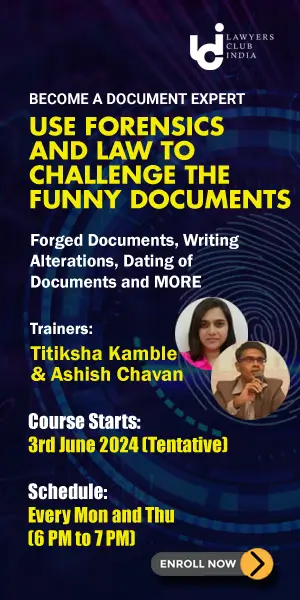JUDGMENT SUMMARY:
In this case of Asst. General Manager, SBI vs. S. Saradamani, it was held that the law of limitation only bars the judicial remedy and the substantive right of the parties survives and continues to be available in other ways. It was held that rules of limitations are not meant to destroy the rights of the parties.
DATE OF JUDGMENT:
25th May 2021
JUDGES:
Hon’ble Justices Alexander Thomas and K. Babu
PARTIES:
1. Petitioners: Asst. General Manager, SBI, Thiruvananthapuram
Branch Manager, SBI, Kadavoor Branch, Kollam District
2. Respondents: S. Saradamani
Financial Advisor and Chief Accounts Officer (pension), Southern Railways, Chennai
Senior Divisional Manager, Southern Railways, Thiruvananthapuram
SUMMARY
The substantive right of the petitioner bank to recover the excess amount paid to Respondent 1in ways other than judicial remedy is not destroyed because of the rules of limitation. The Petitioner Bank was permitted to recover the excess money from the Respondent’s account for the period of 8th February 2016 to 8th February 2019.
FACTS IN BRIEF
Respondent 1 in this was the wife of a deceased southern railway employee who received a family pension since his death in the year 2007. The pension was disbursed through the petitioner bank. The family pension was to be paid till the deceased would have attained the age of 67 years or till 7 years from the date of his death. However, the bank erroneously continued to pay the pension till January 2019 even though the deceased would have been 67 in 2013. The bank mistakably paid a sum of 1.5 lakh to the applicant till January 2019.
The petitioner realized the mistakes and took measures to adjust the excess amount paid from the original applicant’s account in installments at the rate of Rs. 3,200 per month from February 2019 till December 2022. However, Respondent 1 challenged this process before the Tribunal on the ground that the amount sought to be recovered is barred by limitation.
The Tribunal held that the bank is only entitled to recover the amount due for the period immediately before February 2019 when the mistake was realized. The Tribunal held the bank is only entitled to recover the amount prior to three years to the issuance of notice.
The order of the Tribunal was challenged by the petitioner.
ISSUE CONSIDERED
Whether the Respondent is entitled to resist recovery of the excess amount allegedly paid to her by mistake for the period before the span of 3 years from the date of discovery of the mistake relying on the White Washer’s Case?
IMPORTANT PROVISIONS
1. Section 3 of the Limitation Act – Bar on Limitation
“Subject to the provisions contained in sections 4 to 24 (inclusive), every suit instituted, appeal preferred, and the application made after the prescribed period shall be dismissed, although limitation has not been set up as a defense.”
2. Section 17 (1) (c) of the Limitation Act – Effect of Fraud or Mistake
“The suit or application is for relief from the consequences of a mistake”
PETITIONER'S ARGUMENTS
The counsel for the Petitioner, Adv. Bindumol Joseph argued that the petitioners are entitled to the benefits under section 17 of the Limitation Act. It was contended that for any application for relief from the consequences of a mistake, the limitation period won’t begin till the Applicant person has realized the mistake.
The petitioners relied on the decision of the Top Court in the case of the High Court of Punjab and Haryana & Ors. Vs. Jaydev & Ors. to defeat the claim of the petitioner concerning the White Washer’s case. It was contended that there was no employee-employer relationship between the bank and the deceased so the guidelines issue under the White Washer case won’t apply to the petitioner bank.
The petitioners submitted that the transaction is covered by Section 72 of the Contract Act which says that a person to whom money has been paid by mistake or under coercion must repay or return it.
It was submitted that in this case, the limitation period starts only from January 2019, and hence the petitioner bank is entitled to recover the amount from the Respondent-Applicant.
It was also argued that the rule of limitation merely bars the remedy and not the substantive right. In that scenario, it was submitted that even if a portion of the claim is barred by limitation, it will not hamper the substantive right of the petitioner to recover the excess amount paid because of a mistake.
RESPONDENT’S ARGUMENTS
The learned counsel for the Respondent contended that the transaction involved is covered by Section 72 of the Contract Act and recovery of any amount from Respondent 1 prior to the period of three years from the date the mistake was discovered, is barred by limitation
The Counsel for Respondent, Adv. C. S. Gopalakrishnan Nair argued that the Respondent was entitled to the benefit of the guidelines issued in the White Washer’s case.
In the White Washer’s case, the Top Court had issued guidelines for the situations where recoveries by the employers would be impermissible in law.
JUDGMENT ANALYSIS
• Bank not Entitled to Benefit under Section 17 of the Limitation Act
1. After hearing the rival contentions the court considered the Sales Tax Officer vs. M.D. Abraham case, in which the Kerala High Court had held that if the applicant could have discovered the mistake with reasonable diligence that will suffice to start the running of the time against him.
2. The Court also held that the bank is however not entitled to benefits under section 17 of the Limitation Act as section 17 is only applicable when it is established the discovery of the mistake could not be sooner with reasonable diligence. It was observed that a considerable amount of time had passed between the mistake and the discovery and the mistake could have been discovered earlier with reasonable diligence.
3. The Court held that if the petitioner bank and the Southern Railway had conducted a timely audit they could have discovered the mistake earlier.
4. The Bench observed that the petitioner failed to plead that with reasonable diligence, they could not have discovered the mistake sooner. The Court concluded that the petitioners are not entitled to the benefit of Section 17 of the Limitation Act.
• Limitation Law Only Bars Judicial Remedy
5. The Court also considered the PNB & Ors. Vs. Surendra Prasad Sinha where the Apex Court held that section 3 of the Limitation Act only bars remedy but does not destroy the right of the parties to which the remedy relates. Referring to this principle it was held that the bank is entitled to recover the amount from the respondent-applicant’s account.
6. The Hon’ble Court held that law of limitation only bars judicial remedy and that substantive right remains and continues to be available in other ways.
• Principal-Agent Relationship
7. The Court next considered the question of applicability of the White Washer case and held that the Principal-Agent relationship binds the petitioner.
8. After inspecting the arrangement between the petitioners and Southern Railway, it was concluded that the petitioners have become agents of respondents 1 and 2 for the purpose of pension disbursement.
9. It was observed that even though there was no employer-employee relationship between the bank and the deceased, there was a principal-agent relationship between the Southern Railways and the Bank and this made the guidelines issued by the Apex Court in the White Washer case applicable to the Bank as well.
10. It was founded that there is a principal-agent relationship between the Southern Railway and the Bank, and under Section 226 of the Contract Act, any contracts entered into through an agent and obligations arising from acts done by an agent, may be enforced in the same manner, and will have the same legal consequences as if the contract had been entered into and the acts had been done by the principal in person.
• Total Recovery of Amount – harsh and improper
11. The Hon’ble Court in its judgment held that the petitioners have no case that excess payment of pension happened on account of any incorrect information provided by Respondent 1. It happened as a result of the mistake on the part of the petitioners. Respondent 1 was not the accessory to the mistake committed by the petitioners.
12. The Court observed that the Respondent is above 60 years of age. The Court considered the circumstances and facts of the case and concluded that recovery of the total excess amount would be harsh and iniquitous.
13. As a result of that, it was held that it was impermissible as per law to permit the bank to recover the excess payment made to the respondent before 2016. However, it was held that the petitioners were entitled to recover the amount paid from the period of 8th February 2016 to 8th February 2019 gave them the liberty to realize the amount in 30 instalments.
CONCLUSION
The bottom line of the entire case is that the substantive right of the parties survives even when the law of limitation bars judicial remedy.
The petitioner bank was allowed to recover the excess amount paid to respondent 1. But it was also held that regular audits would have helped to detect the mistake sooner. The court also kept a humanitarian approach and held that total recovery of the excess amount would be harsh and immoral.
It must be noted that it was also held that the principal-agent relationship causes the guidelines passed under the White Washer case to apply to the agent as well, as in this case the petitioner bank.
Click here to download the original copy of the judgement















